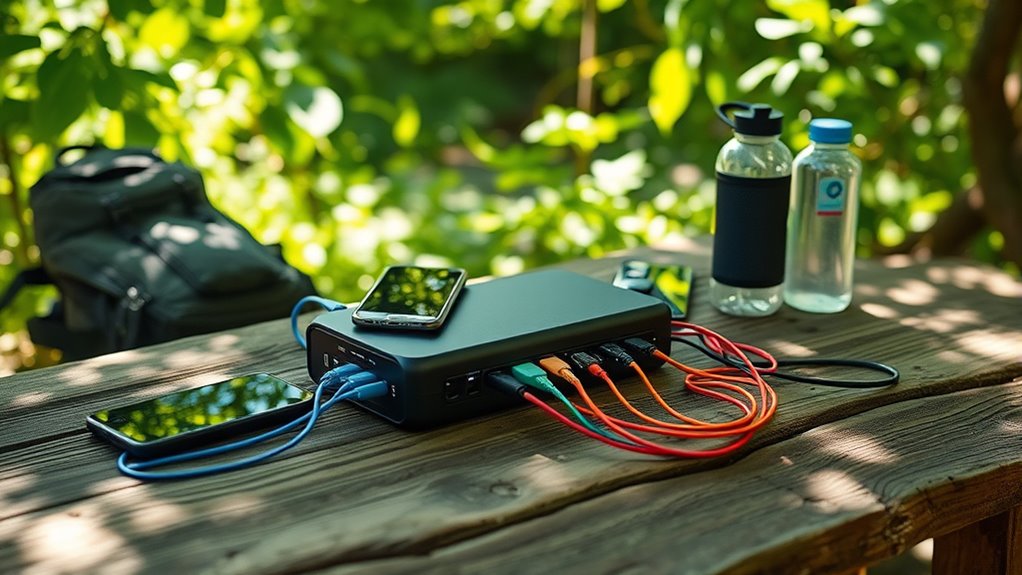If you’re looking for reliable power on the go, I recommend checking out some top portable power stations. They vary in capacity, from compact 88Wh models to larger units over 266Wh, with features like multiple charging ports, fast recharging, and clean energy options like solar compatibility. These devices are perfect for camping, travel, or emergencies. Keep exploring to discover detailed reviews and how to pick the best one for your needs.
Key Takeaways
- Choose from high-capacity models with 88.8Wh to over 266Wh for extended device use.
- Look for versatile ports including AC, USB-C PD, USB-A, and car sockets for broad device compatibility.
- Prioritize fast recharging options via AC, solar, or car adapters to ensure quick power restoration.
- Select lightweight, compact units with handles for easy portability during outdoor or emergency use.
- Consider safety features like BMS, overload protection, and durable build for reliable, long-term performance.
Portable Power Station 99.9Wh Power Bank

If you’re looking for a reliable portable power source that’s perfect for camping, travel, or emergency backup, the Portable Power Station 99.9Wh Power Bank is an excellent choice. Its high-capacity lithium battery provides enough power to keep your devices running longer, while remaining airline-friendly. With six versatile output ports—including AC, USB-C PD, and DC—you can charge laptops, smartphones, tablets, and small appliances easily. The built-in 60W PD fast charging cable ensures quick recharging of your devices. Compact and lightweight, measuring just 6.5 x 3.2 x 1.9 inches and weighing 1.65 lbs, it’s designed for portability and convenience on the go.
Best For: outdoor enthusiasts, travelers, and emergency preparedness individuals seeking a compact, reliable power source for multiple devices.
Pros:
- High-capacity 99.9Wh lithium battery suitable for extended device use on the go
- Multiple versatile output ports including AC, USB-C PD, and DC for broad device compatibility
- Compact, lightweight design (6.5 x 3.2 x 1.9 inches, 1.65 lbs) for easy portability
Cons:
- Limited 80W rated AC power output may not support larger appliances
- Only 2-year warranty might be short for long-term use in some cases
- Recharge time may be longer if not using the integrated 60W PD fast charging cable regularly
Portable Power Station 266Wh Lithium Battery (Model unspecified)
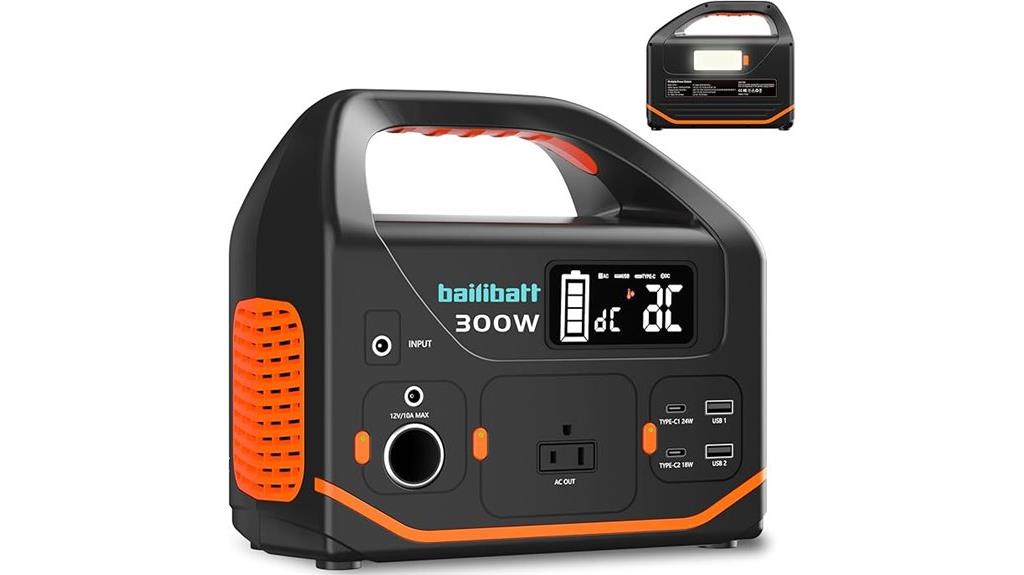
The BailiBatt Portable Power Station with a 266Wh lithium battery is an ideal choice for outdoor enthusiasts and emergency preppers who need reliable, portable power. Weighing just 5.9 pounds, it’s compact and easy to carry, making it perfect for camping, RV trips, or home backup. With a 300W pure sine wave AC outlet and seven versatile ports—including USB-C, USB-A, and a 12V car socket—it powers a wide range of devices safely. It recharges quickly within 1-2 hours and features an LCD screen for real-time monitoring. Its durable design, safety protections, and added flashlight make it a dependable, all-in-one power solution for any situation.
Best For: outdoor enthusiasts, campers, and emergency preppers seeking a portable, reliable power source for small electronics and appliances.
Pros:
- Compact and lightweight design weighing only 5.9 pounds for easy portability
- Multiple versatile output ports including AC, USB-C, USB-A, and 12V car socket for various devices
- Quick recharging time of 1-2 hours with real-time LCD monitoring for convenient use
Cons:
- Limited runtime for larger devices like fans or high-power appliances
- Maximum output of 300W may not support heavier or high-wattage appliances
- Slow recharging if not fully drained, requiring careful management during extended use
EnginStar Portable Power Station 300W Battery Bank with AC Outlet
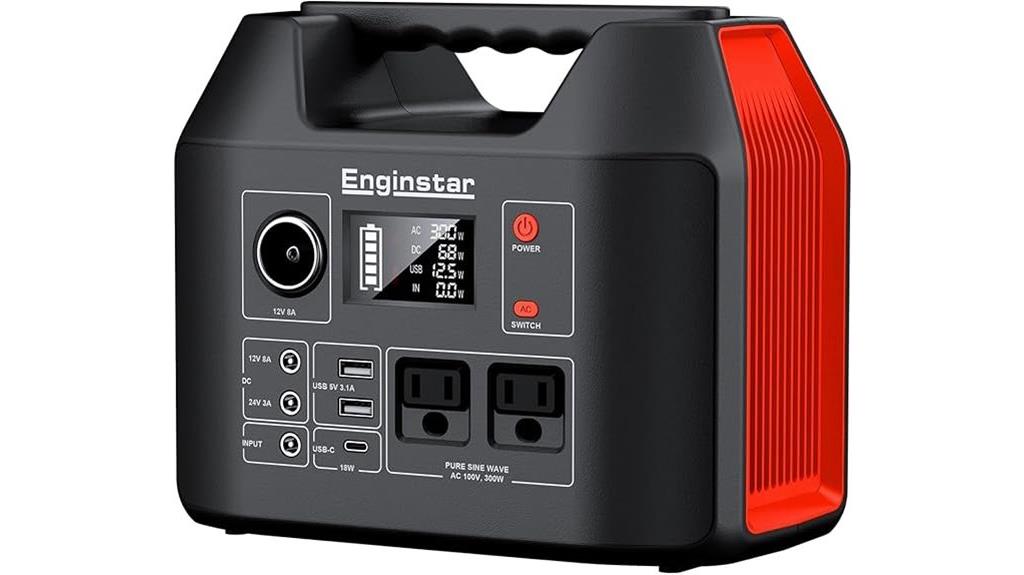
For outdoor enthusiasts and emergency preppers alike, the EnginStar Portable Power Station 300W stands out with its lightweight design and reliable lithium-ion battery. Measuring just 9 x 5.5 x 7.5 inches and weighing around 7.92 pounds, it’s easy to carry anywhere. The 296Wh capacity powers phones, laptops, cameras, CPAPs, drones, and small appliances smoothly via two pure sine wave AC outlets. Its eight output ports, including USB-C and fast-charging USB, support multiple devices simultaneously. With versatile charging options—solar, wall, or car—and built-in safety features, it’s an all-in-one solution perfect for camping, emergencies, and outdoor adventures.
Best For: outdoor enthusiasts, campers, and emergency preppers seeking a portable, reliable power source for multiple devices and sensitive electronics.
Pros:
- Compact, lightweight design weighing under 8 pounds for easy portability
- Multiple output ports including AC, USB-C, and fast-charging USB for versatile device compatibility
- Safe, durable lithium-ion battery with over 1,000 charge cycles and built-in safety features
Cons:
- Limited 300W power output may not support larger appliances
- Solar panel not included, requiring additional purchase for solar charging
- Slight size and accessory storage issues reported by some users
Portable Power Station 99.99Wh Lithium Battery Solar Generator

A standout in the lineup, the Portable Power Station 99.99Wh Lithium Battery Solar Generator is perfect for anyone who needs reliable, portable power on the go. Its aviation-grade lithium battery, approved for cabin carry, guarantees safety and durability. With a 70W pure sine wave AC outlet, I can power laptops, small appliances, or a TV effortlessly. The 12V output supports refrigerators and outdoor gear, while the USB-C PD port charges devices quickly at 24W. I appreciate its versatile charging options—AC adapters or solar panels—and built-in LED lights for emergencies. It’s ideal for camping, outdoor activities, or backup power at home.
Best For: outdoor enthusiasts, campers, and homeowners seeking reliable portable power for emergencies or outdoor activities.
Pros:
- Compact, lightweight design with aviation-grade lithium battery for safety and durability
- Versatile charging options including AC adapters and solar panels for eco-friendly recharging
- Multiple output ports (AC, 12V, USB-C, USB A) support a wide range of devices and appliances
Cons:
- Limited battery capacity at 99.99Wh, may not power larger appliances for extended periods
- 70W pure sine wave inverter restricts usage to low-wattage devices
- No built-in wireless charging feature, requiring wired connections for device charging
Takki Portable Power Station with 88.8Wh Lithium Battery
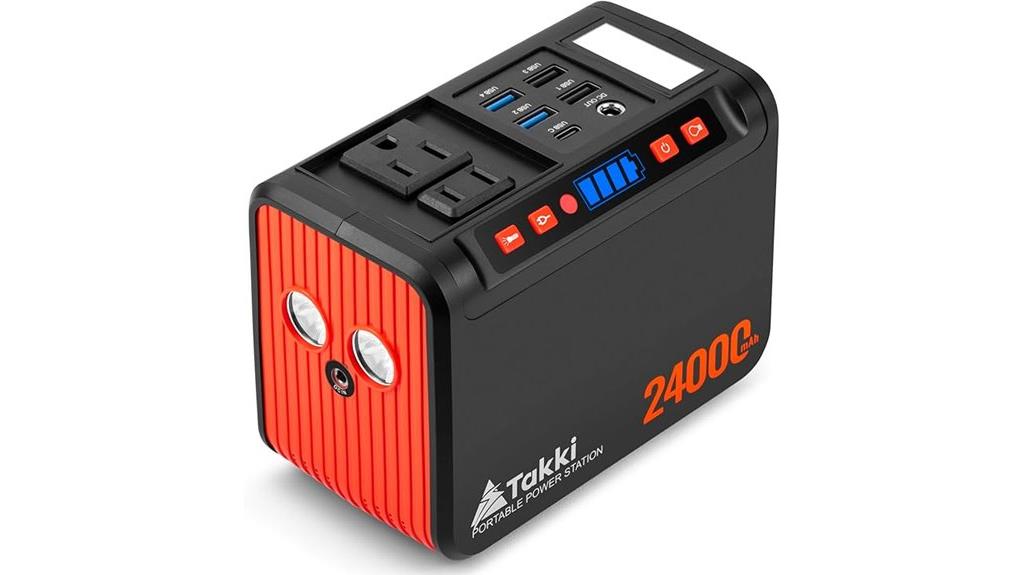
If you’re looking for a compact and lightweight power solution for outdoor adventures or emergency use, Takki Portable Power Station with 88.8Wh Lithium Battery stands out. Its small size (just 5.7 x 4.13 x 3 inches) and light weight (2.29 lbs) make it easy to pack into backpacks or carry on flights. It supports devices up to 80W continuously, with peak power at 120W, and automatically cuts off if overloaded to protect your gear. With fast charging from 0 to 80% in just 2 hours and multiple recharging options—including solar—you can stay powered in remote locations or during unexpected outages.
Best For: outdoor enthusiasts, campers, and emergency preparedness individuals seeking a compact, lightweight power source for small devices.
Pros:
- Compact and lightweight design (5.7 x 4.13 x 3 inches, 2.29 lbs) for easy portability and travel.
- Supports multiple recharging options including solar, making it versatile in remote locations.
- Equipped with multiple output ports and safety features like MPPT controller and cooling fan for reliable use.
Cons:
- Limited to devices up to 80W, not suitable for high-power appliances.
- Might require additional accessories (e.g., solar panels, car charger) not included.
- Battery capacity (88.8Wh) may be insufficient for extended power needs or larger devices.
Portable Power Station 300W 257Wh Lithium Battery Bailibatt
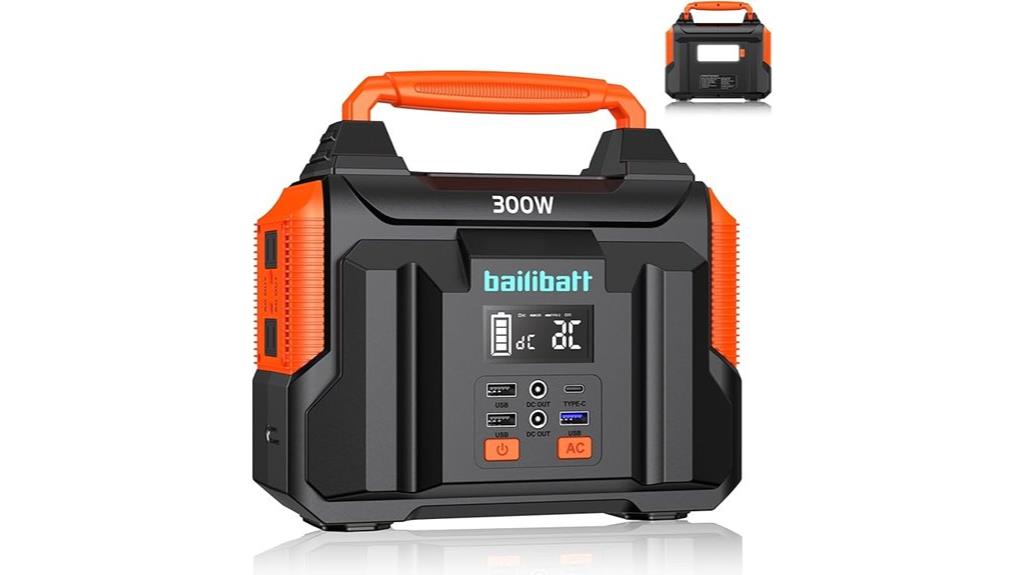
The BailiBatt Portable Power Station stands out with its lightweight design and 257Wh lithium battery, making it an excellent choice for outdoor enthusiasts and travelers who need reliable backup power on the go. Weighing only 4.6 pounds, it’s highly portable and perfect for camping, emergency prep, or travel. With dual 120V AC outlets, 12V DC, and the capacity to run up to eight devices simultaneously, it delivers stable, efficient power for phones, laptops, cameras, and small electronics. Its grade-A battery supports over 1500 charge cycles, and the built-in BMS guarantees safety. Overall, it’s a versatile, compact power solution for any adventure or backup need.
Best For: outdoor enthusiasts, travelers, and emergency preparedness individuals seeking a lightweight, reliable portable power source for multiple devices.
Pros:
- Compact and lightweight at only 4.6 lbs, easy to carry on the go
- Supports up to 8 devices simultaneously with stable power delivery
- Durable grade-A battery with over 1500 charge cycles and built-in safety protections
Cons:
- Does not include a car charger or solar charging accessories
- Limited to a 300W power output, not suitable for high-wattage appliances
- Requires recharging at least once every 1-2 months if unused to maintain battery health
EF ECOFLOW Portable Power Station DELTA 2

With a massive 1024Wh LiFePO4 battery and the ability to expand up to 3kWh, the EF ECOFLOW Portable Power Station DELTA 2 stands out as an ideal choice for campers, homeowners, and off-grid adventurers who need reliable, long-lasting power. It charges quickly—80% in just 50 minutes via AC—and supports up to 500W solar input for eco-friendly, off-grid charging. With 1800W AC output and 15 versatile outlets, it can run most household appliances quietly and cleanly. Its durable LiFePO4 chemistry offers over 3,000 charge cycles, ensuring years of dependable use. Plus, its expandable capacity and all-encompassing recharging options make it a versatile, reliable power solution.
Best For: campers, homeowners, and off-grid adventurers seeking a reliable, long-lasting, and eco-friendly portable power solution.
Pros:
- Rapid charging capability (0-80% in 50 minutes) for quick power top-ups
- Expandable capacity up to 3kWh to meet varying energy needs
- Long-lasting LiFePO4 battery with over 3,000 cycles for durability
Cons:
- Relatively heavy and bulky for portable use over long distances
- Higher initial cost compared to traditional generators
- Limited solar input capacity (up to 500W), which may slow down off-grid charging in low sunlight conditions
MARBERO Portable Power Station 88Wh Camping Lithium Battery
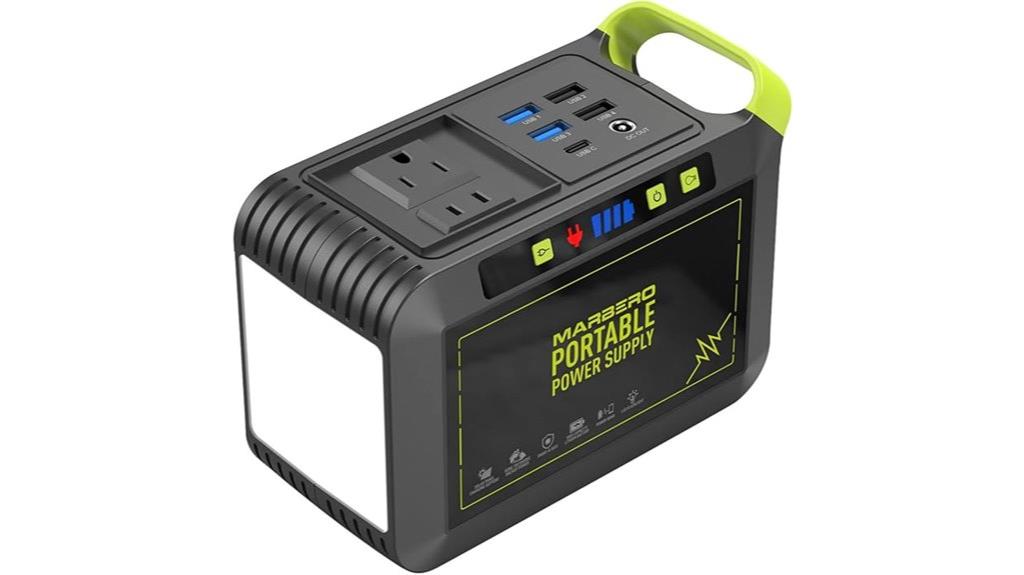
Designed for outdoor enthusiasts and emergency preppers alike, the MARBERO Portable Power Station 88Wh stands out with its lightweight design and versatile charging options. Weighing just 2.29 pounds, it’s easy to carry on camping trips, RV adventures, or as backup power at home. It features AC, DC, USB, and USB-C PD ports, allowing me to charge multiple devices simultaneously—phones, tablets, laptops, and small appliances. With an efficient 80W rated output and support for solar charging, it’s perfect for off-grid use. The built-in flashlight with SOS mode adds an emergency edge, making it a reliable companion wherever I go.
Best For: outdoor enthusiasts, emergency preppers, and anyone needing portable, versatile power on the go.
Pros:
- Lightweight and highly portable at just 2.29 pounds, easy to carry on outdoor adventures or as a backup power source.
- Multiple charging options including AC, DC, USB, and USB-C PD ports support charging various devices simultaneously.
- Built-in flashlight with SOS mode provides emergency lighting and safety features for outdoor or roadside situations.
Cons:
- Limited capacity of 88Wh may not be sufficient for powering larger or high-energy devices for extended periods.
- Supports solar charging only with dedicated 30W or 60W panels, which may require additional investment.
- The device’s 80W rated output could be limiting for larger appliances or higher-power devices.
Go 300 Portable Power Station, 288Wh LiFePO4 Battery

If you need a portable power station that combines high capacity with rapid charging capabilities, the Go 300 stands out as an excellent choice. With a 288Wh LiFePO4 battery, it provides reliable power for smartphones, laptops, and routers. Its 300W continuous AC output and seven ports, including dual USB-C ports supporting PD 3.1 fast charging at 140W each, ensure quick device recharging. The Go 300 supports solar, USB-C, and car charging, making it versatile for off-grid adventures or emergency backup. Its compact, durable design, combined with smart features like app control, makes it easy to manage power on the go, wherever you are.
Best For: outdoor enthusiasts, travelers, and emergency preparedness users seeking a reliable, portable power solution with fast charging capabilities.
Pros:
- High-capacity 288Wh LiFePO4 battery with a lifespan of up to 10 years
- Supports rapid PD 3.1 fast charging at 140W via dual USB-C ports
- Versatile charging options including solar, USB-C, and car charging for off-grid use
Cons:
- Limited 300W continuous AC output may restrict power-hungry devices
- Slightly heavier and bulkier compared to smaller portable chargers
- Requires compatible solar panels and accessories for optimal solar charging setup
Portable Power Station 600W 293Wh
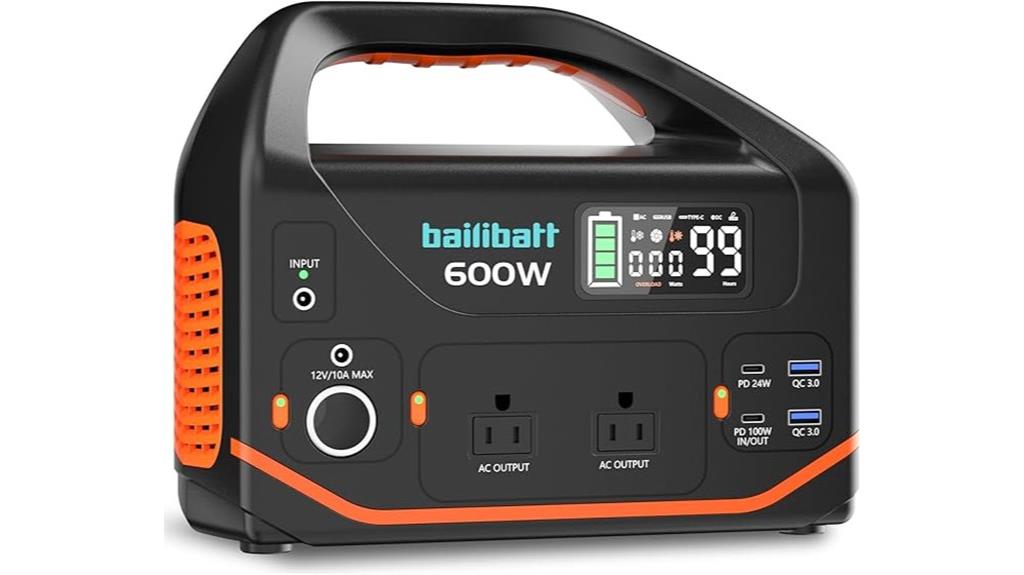
The Portable Power Station 600W 293Wh stands out as an ideal choice for outdoor enthusiasts and emergency preparedness, thanks to its lightweight design and reliable power output. Weighing only 7.7 pounds, it’s easy to carry, making it perfect for camping, travel, or power outages. With a pure sine wave AC outlet supporting up to 600W (1200W surge), it can run most small appliances and devices. Its 293Wh lithium battery offers over 1500 charge cycles, ensuring long-term use. Multiple output ports—including USB-C, USB-A, car, and DC—allow you to charge various devices simultaneously. Plus, safety features and a clear display make operation straightforward and secure.
Best For: outdoor enthusiasts, campers, and emergency preparedness individuals seeking a lightweight, reliable portable power source for various devices.
Pros:
- Compact and lightweight at only 7.7 pounds for easy portability
- Supports multiple devices with versatile output ports including USB-C, USB-A, car, and DC
- Long-lasting with over 1500 charge cycles and built-in safety features for secure use
Cons:
- Limited to 600W continuous power, which may not accommodate larger appliances
- Battery capacity of 293Wh might require frequent recharging during extended use
- Does not include a car charger cable, requiring an additional purchase for vehicle charging
Anker SOLIX C300 Portable Power Station (No Wall Charger)
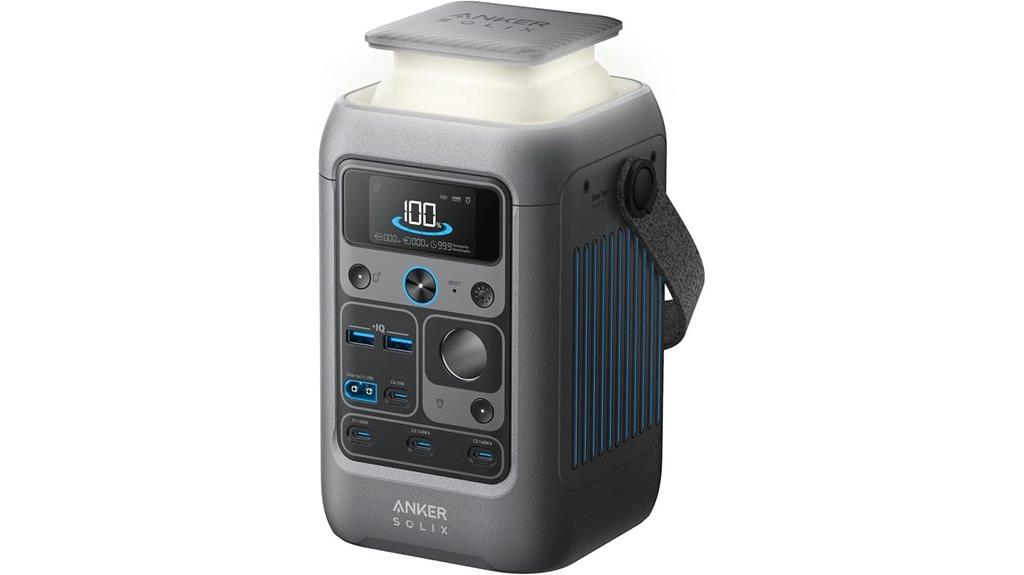
For outdoor enthusiasts and travelers seeking reliable power on the go, the Anker SOLIX C300 Portable Power Station stands out thanks to its high-capacity 288Wh battery and versatile charging options. It delivers 300W of power across 7 ports, including USB-C, USB-A, and a car socket, supporting fast charging and high-wattage devices. Its impact-resistant, compact design makes it perfect for camping, emergencies, or travel. Recharging is flexible with solar panels, car power, or an 18W+ USB-C wall charger (not included). Built with a LiFePO4 battery and smart temperature control, it’s built to last over three years, ensuring dependable power wherever you need it.
Best For: outdoor enthusiasts, travelers, and emergency preparedness individuals needing reliable, portable power solutions for camping, travel, or unexpected outages.
Pros:
- High-capacity 288Wh LiFePO4 battery ensures long-lasting power and durability.
- Versatile charging options including solar, car, and USB-C wall chargers for flexible recharging.
- Compact, impact-resistant design with multiple ports (USB-C, USB-A, car socket) supporting fast and high-wattage device charging.
Cons:
- No included wall charger, requiring an additional purchase for initial activation.
- Limited to USB-C2 and USB-C3 ports for recharging, which may restrict charging options with certain chargers.
- Not compatible with SOLIX PS30, PS200, or PS400 solar panels, limiting solar charging versatility.
HOWEASY Portable Power Station, 88Wh Solar Generator
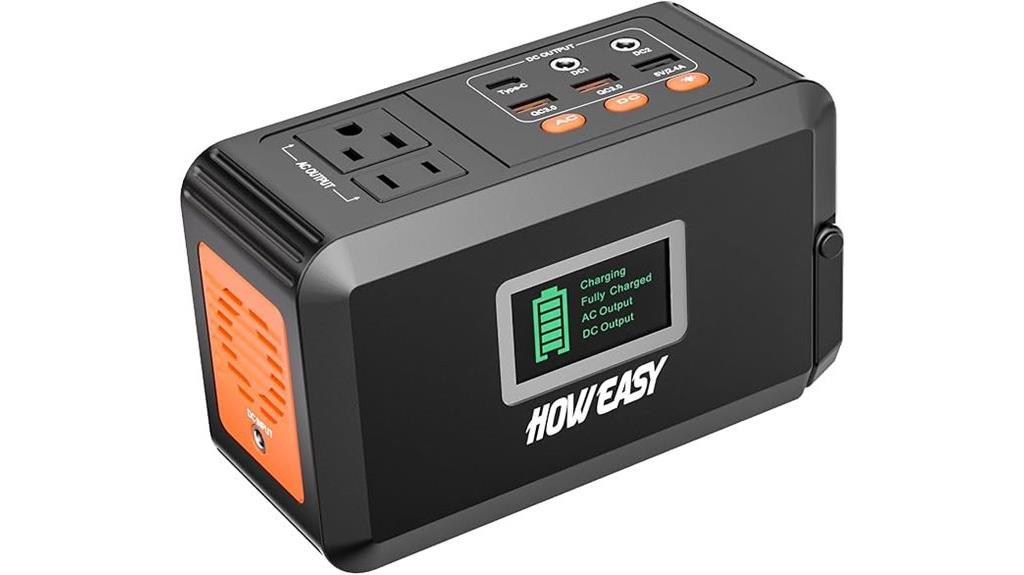
When selecting a compact and lightweight power solution for outdoor activities or emergencies, the HOWEASY Portable Power Station, 88Wh Solar Generator stands out. It features a lithium battery with multiple output options, including two AC sockets (110V, 150W peak), USB-C, QC 3.0, and DC ports, making it versatile for essential devices. Its small size (6.6 x 4 x 3 inches) and weight of just 2.3 pounds, along with a hidden handle, guarantee easy portability. The device supports three recharging methods—AC, solar, and car—and boasts over 1500 cycle life. An LED display and built-in flashlight enhance its convenience for outdoor or emergency use.
Best For: outdoor enthusiasts, campers, and emergency preparedness individuals seeking a lightweight, versatile power source for essential devices.
Pros:
- Compact and lightweight design (6.6 x 4 x 3 inches, 2.3 pounds) for easy portability.
- Multiple output options including AC, USB-C, QC 3.0, and DC ports for versatile device charging.
- Supports three recharging methods (AC, solar, car) with over 1500 cycle life for durability.
Cons:
- Limited to a maximum of 150W output, which may not power higher-wattage devices.
- Solar panel not included, requiring an additional purchase for solar recharging.
- Basic LED display may not provide detailed information about power consumption or battery health.
GRECELL Portable Power Station 300W (230Wh) Solar Generator

If you’re searching for a lightweight, reliable portable power station that can handle most outdoor needs, the GRECELL 300W (230Wh) Solar Generator stands out. It offers enough capacity to power laptops, phones, lights, and small appliances like mini-fridges or TVs, with a continuous 300W output and surge up to 600W. Its versatile charging options include AC, solar, car, and fast Type-C, allowing quick recharges in about 1.5 hours. Built with safe, durable LiFePO4 batteries and equipped with multiple ports and safety features, it’s perfect for camping, RV trips, or emergencies. The compact design makes it easy to carry anywhere you go.
Best For: outdoor enthusiasts, campers, and families seeking a reliable, portable power source for camping, RV trips, or emergency use.
Pros:
- Lightweight, compact design for easy portability and outdoor convenience
- Supports multiple recharging methods including fast Type-C, solar, AC, and car, with quick recharge in about 1.5 hours
- Equipped with high-quality LiFePO4 batteries and multiple safety features for safe, long-lasting use
Cons:
- Does not include a fast Type-C 100W charging cable, requiring additional purchase
- Limited to a 230Wh capacity, which may not suffice for high-power devices or extended power needs
- The surge capacity of 600W might be insufficient for larger appliances or tools
Portable Power Station, 600W (1200W Peak) 299Wh LiFePO4 Solar Generator
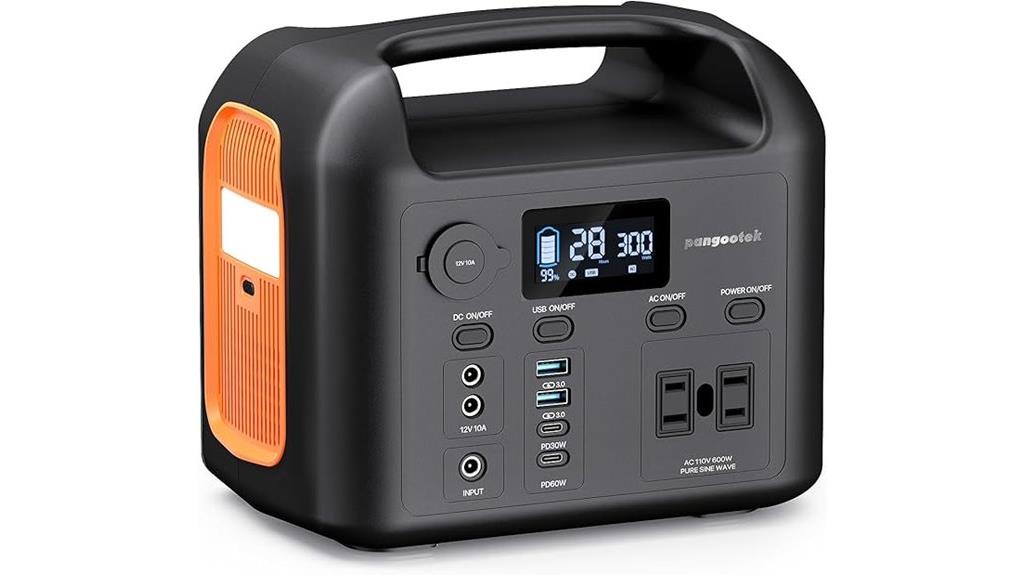
The Pangootek R600 Portable Power Station stands out as an ideal choice for outdoor enthusiasts and emergency preppers alike, thanks to its reliable 600W continuous power and long-lasting LiFePO4 battery. Weighing just 8.7 pounds, it’s lightweight and easy to carry, yet delivers stable, clean power with pure sine wave technology. With 9 versatile outputs—including AC, USB, Type-C, and cigarette lighter—you can charge multiple devices simultaneously. Recharging is flexible via AC, solar, or car, taking just a few hours. Its robust BMS system guarantees safety and long battery life, making it a dependable companion for outdoor adventures or emergencies.
Best For: outdoor enthusiasts, emergency preppers, and anyone needing reliable portable power for multiple devices in outdoor or emergency situations.
Pros:
- Lightweight and portable at only 8.7 pounds for easy carrying
- Multiple output options including AC, USB, Type-C, and cigarette lighter for versatile device charging
- Long-lasting LiFePO4 battery with over 2000 cycles ensuring durability and safety
Cons:
- Solar panels are not included, requiring additional purchase for solar recharging
- Recharging times can be lengthy depending on the power source, especially with solar panels
- Limited overall capacity at 299Wh may not support high-power devices for extended periods
Factors to Consider When Choosing a Portable Power Station
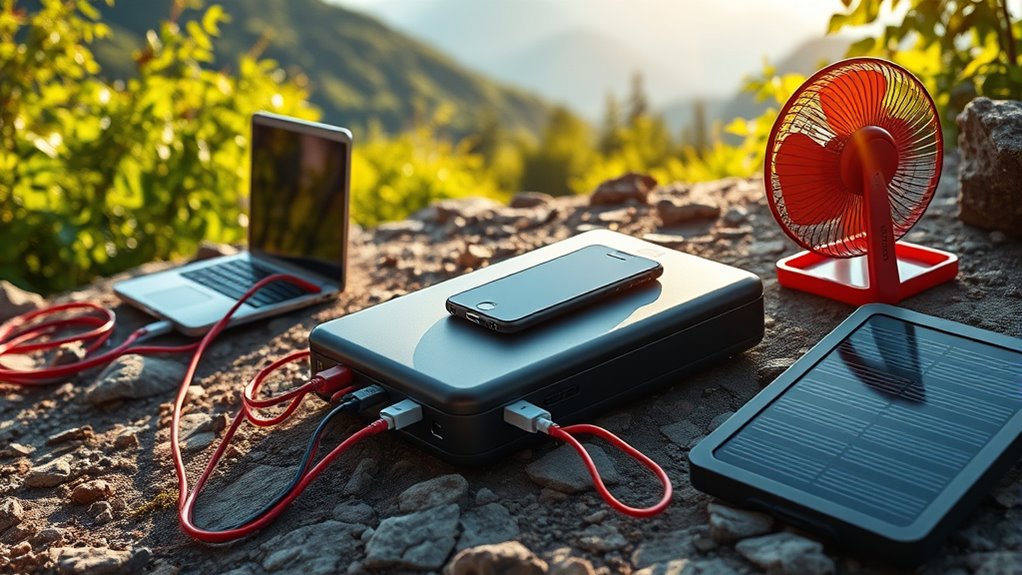
When choosing a portable power station, I focus on matching the battery capacity to my needs and ensuring it can handle my devices’ power output. I also consider the available ports, recharging options, and how portable the unit is for my activities. These factors help me pick a station that’s reliable, versatile, and easy to carry.
Battery Capacity Needs
Choosing the right portable power station depends heavily on understanding your device power needs. First, assess the wattage and runtime you require for your essential devices by calculating their power consumption. Higher battery capacities, like 266Wh or 300Wh, offer longer usage but tend to be bulkier and heavier. If you frequently run multiple devices or need extended power, opt for a capacity that exceeds your total wattage needs to guarantee reliability. Keep in mind, larger capacities also mean longer recharging times, which can affect convenience. Balancing capacity with portability is key; selecting a power station with enough capacity to meet your daily demands without unnecessary bulk will keep your devices charged when you need them most.
Power Output Compatibility
Matching your power station’s output to your devices’ needs is crucial for reliable performance. First, verify the continuous wattage output can handle the total power draw of all devices you’ll connect at once. Check for compatible ports like AC outlets, USB-C, USB-A, and DC outputs to match your gear. It’s also important to confirm the surge wattage rating, which handles short power spikes from sensitive or high-inrush devices, preventing shutdowns or damage. Additionally, confirm that the power station’s voltage and current outputs align with your equipment’s specifications to avoid inefficiency or harm. Versatility matters too—having multiple output options ensures the station can support various devices and charging standards. Getting these compatibility factors right guarantees smooth, safe, and effective power delivery wherever you go.
Port Selection Options
The variety and placement of ports on a portable power station directly impact how effectively you can connect your devices. Multiple output options like AC, USB-C, USB-A, and DC ports provide versatility, enabling you to power a range of electronics simultaneously. The number and type of ports determine compatibility and convenience, especially when you need quick access to charging multiple devices. Fast-charging USB-C ports with Power Delivery support up to 60W or more are valuable for rapid recharging. Additionally, the placement and accessibility of these ports are vital, especially in outdoor or emergency situations where quick, easy connections matter. Some stations also feature specialized ports, such as car cigarette lighter outlets or dedicated DC outputs, broadening their utility for various power needs.
Recharging Flexibility
To guarantee your portable power station keeps up with your needs, it’s essential to take into account its recharging flexibility. A versatile unit should support multiple recharging methods, like AC outlets, solar panels, and car chargers, ensuring you stay powered in various scenarios. Fast recharging capabilities, such as reaching 80% in 1-2 hours via USB-C PD or AC, help minimize downtime and keep you productive, especially outdoors or during emergencies. Solar recharging offers eco-friendly options and independence from the grid, which is a major advantage. Additionally, compatibility with different voltages and connectors broadens device support. Regular maintenance recharges, every 1-2 months, are crucial to preserving battery health and ensuring excellent performance over time. Flexibility in recharging options is key to reliable, long-term use.
Size and Portability
Choosing a portable power station means considering how easy it is to carry and fit into your gear. Size and weight directly affect how convenient it is to transport, especially for outdoor adventures or emergencies. Compact models, usually around 5 to 7 inches in each dimension and under 10 pounds, are ideal for portability, fitting easily into backpacks or glove compartments. Larger units with higher capacity tend to be bulkier and heavier, making them less suitable for quick mobility or backpacking. Features like foldable or integrated handles can make carrying simpler. By paying attention to overall dimensions and weight, you guarantee your power station can be stored comfortably in your vehicle, bag, or emergency kit without adding unnecessary bulk or weight.
Safety and Durability
Ensuring safety and durability when selecting a portable power station is crucial for reliable performance, especially in outdoor or emergency situations. I look for models with advanced Battery Management Systems (BMS) that monitor voltage, current, and temperature, preventing overcharging, over-discharging, and overheating. Choosing lithium-ion or LiFePO4 batteries is essential because they offer greater thermal stability, longer cycle life—over 1,000 cycles—and safer operation compared to older chemistries. Built-in protections like overload, short circuit, and automatic shutoff add extra safety layers for both the device and my electronics. I also verify that the power station complies with safety standards such as UL or UN certifications. Finally, I prioritize models with impact-resistant exteriors and sturdy construction to withstand outdoor conditions and accidental drops.
Device Compatibility
When selecting a portable power station, making certain it can handle your devices’ specific charging needs is key. Check that it has the right output ports—AC, USB, or DC—to match your devices. Pay attention to wattage limits for each port to ensure your gadgets won’t be damaged or underpowered. If you need quick charging, look for support for fast-charging standards like USB-C PD. Also, verify the station’s maximum continuous and surge power ratings to see if it can handle high-wattage devices safely. Finally, confirm that your devices’ voltage and plug types are compatible with the power station to prevent malfunctions or damage. Proper compatibility guarantees reliable, safe power for all your electronics wherever you go.
Budget Considerations
Setting a clear budget is the first step to finding the right portable power station, as prices can range from under $100 to over $1,000 depending on capacity and features. I recommend balancing cost with your power needs, so you don’t overspend on unnecessary extras. Consider long-term value by checking battery lifespan, recharging options, and warranty coverage, since higher-quality units tend to be more durable and save money over time. Keep in mind that models with larger capacity, multiple ports, and fast charging capabilities usually come at a higher price. Be realistic about your usage patterns and select a unit that matches your specific needs without overspending on features you won’t use often. This approach ensures you get the best value for your investment.
Frequently Asked Questions
How Long Do Portable Power Stations Typically Last on a Full Charge?
A portable power station typically lasts anywhere from a few hours to several days on a full charge, depending on its capacity and what you’re powering. I’ve found that smaller units might run a smartphone for days, while larger ones can keep a mini fridge or multiple devices running longer. It’s always a good idea to check the watt-hour rating to get a clearer idea of how long it will last for your specific needs.
Are Portable Power Stations Safe to Use Indoors?
Yes, portable power stations are generally safe to use indoors when you follow the manufacturer’s instructions. I always make sure to keep them in well-ventilated areas and avoid covering vents or fans. It’s important to use the right charger and not overload the unit. As long as I follow safety guidelines, I feel confident using my power station indoors without any issues.
Can Portable Power Stations Operate Sensitive Medical Devices?
Yes, portable power stations can operate sensitive medical devices, but you should check their specifications first. I always confirm they provide stable, pure sine wave power, which is safe for delicate electronics like medical equipment. It’s essential to verify the wattage and compatibility beforehand. When used correctly, these stations offer a reliable backup power source, giving me peace of mind knowing my devices stay powered safely during outages or on the go.
What Is the Maximum Output Wattage for Most Portable Power Stations?
Most portable power stations have a maximum output wattage ranging from 300W to 2000W, depending on their size and capacity. I’ve found that smaller units are great for phones and small gadgets, while larger ones can power mini-fridges, laptops, and even some power tools. Always check the wattage rating before plugging in your devices to guarantee compatibility and prevent overloads.
How Do Weather Conditions Affect Portable Power Station Performance?
Did you know that extreme weather can reduce a portable power station’s efficiency by up to 20%? I’ve found that cold temperatures slow down battery chemistry, making charging slower or less reliable. Conversely, high heat can cause overheating and damage the device. When using my power station outdoors, I always try to keep it in a shaded, moderate environment to guarantee peak performance and longevity.
Conclusion
No matter which portable power station you choose, you’ll never have to fear a dead battery again. These compact giants are like tiny energy vaults, ready to power your adventures and keep your devices alive through life’s wildest storms. Think of it as carrying a lightning bolt in your pocket—lightning-fast, powerful, and unstoppable. Stay charged, stay confident, and let these stations turn every outdoor moment into a seamless, electrified experience!
